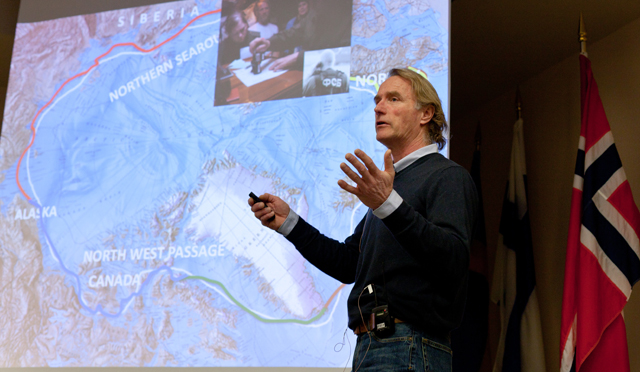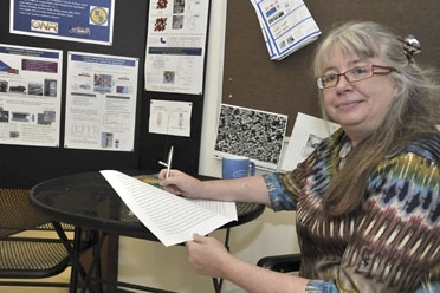Page 1 • (3,790 results in 0.022 seconds)
-
Ambassadors spotlight climate change Growing up in Oregon, recycling was part of junior Kate Wilson’s everyday life.“It was the norm for me,” she said. “I was always passionate about it, but I never knew why recycling was important.” During J-Term, Wilson is among the 16…
January 25, 2008 Ambassadors spotlight climate change Growing up in Oregon, recycling was part of junior Kate Wilson’s everyday life.“It was the norm for me,” she said. “I was always passionate about it, but I never knew why recycling was important.” During J-Term, Wilson is among the 16 students involved in the Climate Change Ambassadors program. The group meets over dinner once a week to learn the facts about global climate change and devise creative ways to share that knowledge with the PLU
-

Explorer Thorleif Thorleifsson highlights his 80 day journey around the Arctic Ocean. (Photo by John Froschauer) Arctic exploration and climate change By Katie Scaff ’13 Changes in the Arctic have become increasingly visible, according to Norwegian explorer Thorleif Thorleifsson, who, with BØrge Ousland, became the…
March 5, 2012 Explorer Thorleif Thorleifsson highlights his 80 day journey around the Arctic Ocean. (Photo by John Froschauer) Arctic exploration and climate change By Katie Scaff ’13 Changes in the Arctic have become increasingly visible, according to Norwegian explorer Thorleif Thorleifsson, who, with BØrge Ousland, became the first to sail around the Arctic in one, short season in 2010. “These are the facts,” Thorleifsson said. “This is happening.” The Scandinavian Cultural Center set the
-

Researcher looks at how climate change leads to innovative science On Sept. 7, the PLU Chemistry department will host a seminar by Debra Rolison in Morken 103 from 12:30-1:35 pm. In her presentation, “How Subversion, Revolution, and Climate Change Lead to Innovative Science–Enhancing Electrochemical Energy…
September 5, 2012 Researcher looks at how climate change leads to innovative science On Sept. 7, the PLU Chemistry department will host a seminar by Debra Rolison in Morken 103 from 12:30-1:35 pm. In her presentation, “How Subversion, Revolution, and Climate Change Lead to Innovative Science–Enhancing Electrochemical Energy Storage on the Macroscale via Architectural Design on the Nanoscale,” Rolison will share her passion for empowering women and minorities in the sciences, and will give an
-
The Wang Center Research Grant Program is designed to support students, faculty, and faculty-student teams that seek to conduct original research in an international setting.
Wang Center Research GrantsThe Wang Center Research Grant Program is designed to support students, faculty, and faculty-student teams that seek to conduct original research in an international setting. Consideration is also given to proposals seeking to conduct research within the United States on topics that underscore the connection of the local and global issues of diversity, social justice and sustainability. Proposals are reviewed by the Global Education Committee for recommendation to the
-
Attending a chemistry program at a small liberal arts school...gave me post-graduation opportunities!
“Attending a chemistry program at a small liberal arts school…gave me post-graduation opportunities! I was able to do research at PLU, research through an REU program at an R1 school, and had multiple post-graduation options months before I graduated. Thank you for preparing me for a life of inquiry in the sciences!” – Caleb Chandler ’17 Research By Area Analytical and Environmental Chemistry Angie Boysen, Ph.D. Brian Naasz, Ph.D. Biochemistry Tina Saxowsky, Ph.D. Dave Song, Ph.D. Physical
-
PLU emphasizes the importance of student research and creative projects. From summer-long student-faculty research projects in the natural sciences to student-directed plays in theatre, these
Learning TogetherPLU emphasizes the importance of student research and creative projects. From summer-long student-faculty research projects in the natural sciences to student-directed plays in theatre, these opportunities have many benefits and help students explore and learn more in-depth about an area of study or future career path that interests them, gain invaluable hands-on experience and organizational skills, and learn to balance independent and collaborative work. These research and
-
After beginning a career or graduate studies, our graduates often point to one person at PLU who had a profound influence on their intellectual development. Invariably, it's a professor.
-side with you on research and creative projects. No matter what you plan to do after you earn your PLU degree, you’ll have gained the experience that employers and graduate programs want.Summer research that rocksMany students take part in student-faculty summer research projects, often in the nearby forests, mountains and coastal areas. Read MoreScience happens (And so much more!)Of the numerous student-faculty research projects that take place at PLU each year, there is the science. But that is
-
Virginia Allred ‘17 (Psychology & Geology) Kelsey Barnes ‘16 (Anthropology & Art History) Michael Diambri ‘18 (History) Rachel Friedland ‘18 (Undeclared) Madeline Marello ‘18
Spring 2015 Research TeamVirginia Allred ‘17 (Psychology & Geology) Kelsey Barnes ‘16 (Anthropology & Art History) Michael Diambri ‘18 (History) Rachel Friedland ‘18 (Undeclared) Madeline Marello ‘18 (Psychology) Brock Martin ‘18 (Environmental Studies)Adrian Mayoral ‘15 (History) Emma McCain ‘17 (Anthropology) Savannah Phelan ‘15 (Anthropology & Religion) Shaun Spurlock ‘15 (Religion) Carli Snyder ‘16 (History & Women’s and Gender Studies)Michaella Thompson ‘16 (History & Anthropology
-
Students are encouraged to do research with a faculty member during their undergraduate experience at PLU.
Faculty Research InterestsStudents are encouraged to do research with a faculty member during their undergraduate experience at PLU. Check the Natural Sciences website for more information about the Undergraduate Research summer program.Ann Auman I am a microbial ecologist interested in studying microbial communities in natural environments with the goals of understanding how the microbes are contributing to global processes and what products these microbes may be making that may be of
-
When talking about locating sources for an assignment, students often remain task-oriented and focus on “finding” rather than on learning, and our own research demonstrates this remains true for
When talking about locating sources for an assignment, students often remain task-oriented and focus on “finding” rather than on learning, and our own research demonstrates this remains true for many PLU students. In general, students already know how to search for information but are unable to apply what they already know into a new context. In other words, students need guidance with framing research questions, seeing patterns in the literature, weighing the relevance of evidence, and
Do you have any feedback for us? If so, feel free to use our Feedback Form.


